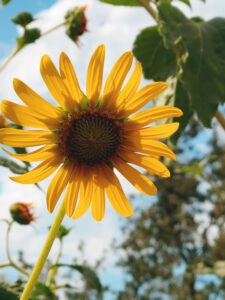
Consider using as a fast growing one year hedge or division between areas in the garden. The Common Sunflower is an annual which grows quickly to 5 to 8 feet with fifty or more flowers on each plant. You will be rewarded with an amazingly fast-growing plant with a high branching habit. Butterflies including the Monarch use the nectar of the flowers. When the flowers fade, small birds such as the Lesser Goldfinch flock to the seed heads to feast on the abundant seed. It is amazing to see these small birds hanging upside down on the swaying branches to gather seed.
Seed is available to be purchased online from Theodore Payne Foundation (store.theodorepayne.org) or can be gathered from mature plants. Only collect seed if you have permission and never from the wild. If you collect flower heads, separate the seed from one or two spent flowers and store the dry seed in a sealed, labeled container in your refrigerator until the spring. When the weather warms in the spring, plant the seed and cover lightly with soil. Do not cover with compost or woodchips. Alternatively, you can germinate the seed in small pots and plant out in you garden as young plants. Sunflowers will need watering if there are not consistent spring rains. This is a great plant for a children’s garden because of the quick growth and impressive flower display. The sunflower will self seed in following years.
The sunflower is the ancestor of our commercial sunflowers and the sunflower seeds which we eat. This plant has been cultivated since prior to Aztec times and has many uses both to people and animals. The Russians developed the single large headed sunflower which is now widely used for oil, seed, and feed.
Maintenance is super easy. The most important task is plant it where it has room to grow. The Common Sunflower can in one year grow up to eight feet tall and six or more feet wide. Thin the young plants so that they are three feet apart. After the birds have feasted on the seeds, the stalks can easily be pulled out. Sunflowers do best in full sun with weekly watering when they are young. Their root systems are shallow, if grown as a single plant, they benefit from staking. In nature they tend to grow as a clump of plants.
More information on this plant can be found at calscape.org by searching for the plant by name.
The following are just five of the plants which you can see blooming in a quarter mile walk along the Tule River Parkway between Jaye Street and Parkway Drive in Porterville California.
- Common Sunflower (Helianthus annuus)
- Woolly Blue Curls (Trichostema lanatum)
- California Fuchsia (Epilobium several species)
- Desert Marigold (Baileya multiradiata)
- Common Lippia (Phyla nodiflora)
Many California native plants are available at Luis’ Nursery 139 S Mariposa Ave, Visalia, Quercus Landscape Design in Springville https://quercuslandscapedesign.com/availability, and Alta Vista Nursery in Three Rivers which is open by appointment 559 799 7438.
Each of the Native Plant Demonstration Gardens is featured on the website tuleriverparkwayassociation.org
The Tule River Parkway is a City of Porterville public park which features a three-mile paved walking and bicycle path. The gardens were planted and maintained by volunteers with project management by the Tule River Parkway Association. We have three volunteer garden days each month. Follow Tule River Parkway Association on Facebook for announcements. Volunteers are welcome to join us to care for the gardens September 3, 15, and 17, from 8 am till 10:30 am. TRPA is holding a special event on Sunday September 11, 2022. The event will include a docent lead walk of the gardens at 9 am and a milkweed giveaway to home gardeners at 10 am. The event will be held at the Jaye Street parking lot across the street from Harbor Freight on Jaye Street in Porterville.
Visit and join our Facebook group of the same name. The public is encouraged to explore the gardens to learn more about the featured plants and the project. We are looking for volunteers to adopt a garden or restoration area. For More information contact TRPA at tulerivergardens@gmail.com or Cathy Capone at 559 361 9164.
